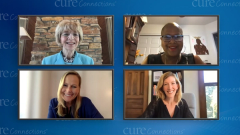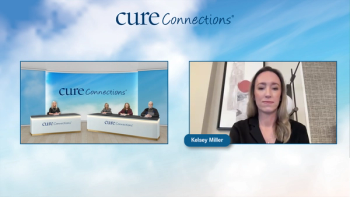
Clinical Trial Considerations in Metastatic Breast Cancer
Julie Larson, LCSW, provides insight into reasons for joining clinical trials, finding trials from peers, and trials for purposes other than cancer treatment.
Episodes in this series

These are the experiences and opinions of panelists, not physicians.
Shirley A. Mertz, MA, JD: Julie, I know this is not necessarily your area, but do you have any comments about clinical trials that you may have learned or come up from your discussions with clients?
Julie Larson, LCSW: Absolutely. I feel like I've been in here forever as I've been doing this for 17 years. That makes me feel really old. Sometimes I challenge it when people say there's been no advancement in cancer because I can remember being in my office - I started my career at cancer care when Herceptin was beating all of the standards of care, and everything was stopped on the spot- on a dime, and people were flipped. I think the message I'm meaning to say in that is that this clinical trial could outperform a standard of care and then we've just hit a different level. This is where the future lives. In other ways when you ask me, "How do you find out about clinical trials?" Your peers. We just spent the last little section talking about support group. Your support group and your peers are invaluable to you. So often I think those conversations come up in support groups or come up in those peer-to-peer interactions and we were like, "What do you mean you're taking that? Or tell me more about that." Take those notes, gather that information, and let that be a conversation starter for your doctor. Yes, I think that we can find things on the internet. You've mentioned some wonderful websites that are full of information. I think that's great. You can always be researching and seeking answers to your questions, but I think you can also find it in support groups through second opinions. Second opinions don't always happen when you're dissatisfied with a doctor, second opinions also happen when we just simply want more information or perhaps validation and confirmation of what's happening for us. This is where I'm at and I want to make sure that that's the right thing. And I really am feeling like I have a great relationship with my oncologist.
Shirley A. Mertz, MA, JD: I'm so glad you brought that up, Julie, because I was leaving the impression by what I said, that when you're unhappy you get a second opinion.
Julie Larson, LCSW: I have a reason. It's available to you. I think there are myths around that too, of betrayal, and that I will hurt my doctor's feelings. I think that those are myths we need to come back to that most doctors are very understanding and accepting of that process. One more thing I'll say about clinical trials is that they're not all about the treatment exactly of your cancer. There are clinical trials out there looking at fatigue, looking at pain, looking at complementary integrative medicine. If you are experiencing some of these other side effects, there are likely maybe some clinical trials looking at that too.
Shirley A. Mertz, MA, JD: That's very well said, and I'm glad you brought that up because sometimes we need care for those kinds of things that are not a treatment exactly but can help us get through some toxicities or just what we're feeling from our disease and/or the treatment.
This transcript has been edited for clarity.




